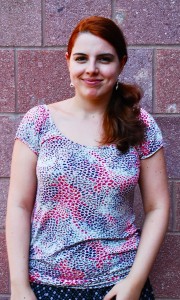
By Aditya Nag
nagadity@grinnell.edu
Corina Varlan ’14 spent ten weeks this summer as an intern with the Romanian Mission to the United Nations, sponsored by Grinnell’s Rosenfield Program. During her time in New York, she got to sit in on the General Assembly, take notes on negotiations and carry a diplomat pass.
Briefly, what did you do this summer?
This summer, I interned with The Permanent Mission of Romania to the United Nations, in New York. My internship was sponsored by The Rosenfield Program here in Grinnell.
What exactly did you do inside the United Nations building?
I mostly worked with the legal adviser [of The Permanent Mission of Romania] who deals with 6th Committee issues – legal, judicial issues. The mission is very small, so I would be sent in to cover a lot of different themes…I also attended rule-of-law negotiations. The rule-of-law will be the topic of the high-level meeting this September—next week, in fact! Also, the New York working group of the International Criminal Court, along with some other topics that were less interesting—piracy off the coast of Somalia, or sanctions! On a more interesting note, I dealt with work on the 3rd Committee (Humanitarian), for example following a resolution about human security.
Where there any particular session that stood out for you?
It was really interesting to sit in on the session where we voted on the counter-terrorism strategy. It was a General Assembly session voting on the strategy, which had been negotiated for a month or so. And there were a lot of interesting and heated statements!
Can you recall any? You don’t have to name people!
No, I can’t… I can’t get into specifics. But it was very interesting. And I also worked on the 3rd stage of the Rio+20 conference on sustainable-development negotiations. I worked on the EU stage of the negotiations as well as the United Nations 3rd stage of the negotiations, and it was really interesting. This falls under the 2nd committee of the UN.
So can you name some well-known figures you met or just ran into?
[I saw] Ban-Ki-Moon (Secretary-General of the UN)!
Did you ever respond to anything he asked in assembly?
No, I didn’t. As a diplomat, you can only speak if you have formal instructions. But I also met and talked to the ambassador of Spain. I had a few conversations with my ambassador, Simona Miculescu.
Can you highlight some learning experiences?
I learned a lot about being a diplomat, firstly. I think it’s important to know how to make connections and build professional relationships. I learned that it’s sometimes important to not say no, even if you have a lot of work to do. I learned that patience is important, because things move a bit slow at the UN sometimes.
Did you ever feel overwhelmed to be in the UN?
Actually the UN is a pretty young place… But it was overwhelming, especially the first time sitting in the General Assembly! You’re aware of the history that happened there, and then you see all these tourists and you’re the one with a diplomat pass who’s allowed in the Security Council. But yes, I was a little panicky in the beginning, especially going into the Security Council. The first thing you have to do is see if your receiver and mic is working, because the sessions are conducted in six languages. But then you sit down, and you take a breath and take it all in…
Take us through the first GA session.
The first session was on counter-terrorism. There are at least eight meetings taking place at the UN headquarters everyday but not all in the GA (General Assembly) room—they take place in GA formats. The first negotiation I took part in was the Rio+20 conference. That was the first time I went into the UN building and sat in on a GA format. I was working mainly with my legal adviser, and she would send me to various sessions taking notes. I was really excited but really scared too!
What kind of work did you do—writing and reporting?
Yeah, I had to report on every negotiation…You know if there were three negotiations a week, I would go to each of them and take notes and report back. I would write a document, and a diplomat would read it and cosign it.
What advice do you have for other aspiring Grinnellians?
Just be daring… ask around!




























































